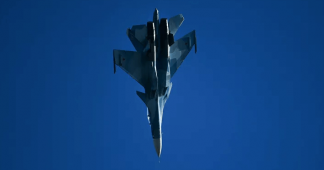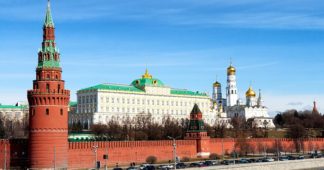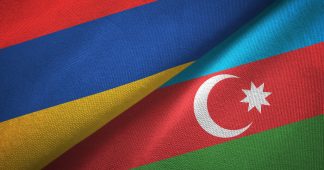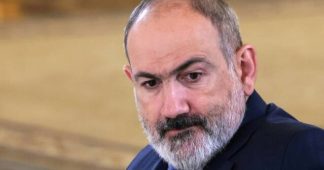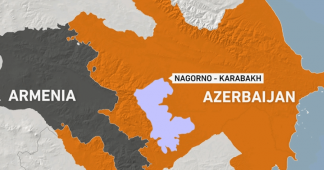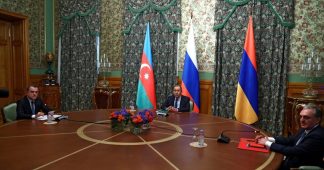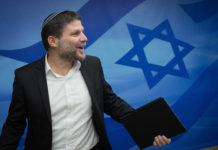Azerbaijan and representatives of the Armenian population of Nagorno-Karabakh have agreed on a cessation of hostilities with mediation of Russian peacekeepers, the Russian Defense Ministry announced on Wednesday. A day before, Baku began an “anti-terrorist operation” in Nagorno-Karabakh, which Yerevan denounced as aggression.
Sep. 20, 2023
Russian President Vladimir Putin said on Wednesday that Russian peacekeepers in Nagorno-Karabakh were actively working with all parties involved in the conflict.
“Our peacekeepers are very actively working with all parties involved in this conflict. They are doing everything to protect the civilian population,” Putin said at a meeting with Chinese Foreign Minister Wang Yi.
Putin voiced Russia’s hope that a de-escalation will be reached.
“We are in very close contact with all parties to the conflict — and the authorities in Yerevan, Stepanakert, and Baku. I hope that we will be able to achieve de-escalation and transfer the solution of this problem to a peaceful course,” the Russian president said.
The remarks came after the Russian Defense Ministry on Wednesday announced that Azerbaijan and representatives of the Armenian population of Nagorno-Karabakh had agreed on a complete cessation of hostilities.
“Through the mediation of the command of the Russian peacekeeping contingent, an agreement was reached between the Azerbaijani side and representatives of Nagorno-Karabakh on a complete cessation of hostilities. The implementation of these agreements will be carried out in coordination with the command of the Russian peacekeeping contingent,” the MoD said in a statement.
The MoD added that the command of Russia’s peacekeeping contingent stationed in Nagorno-Karabakh was maintaining contact with both Yerevan and Baku “at the appropriate level,” and discussing the prevention of bloodshed in the region. “Compliance with the norms of humanitarian law in relation to the civilian population, as well as ensuring the safety of the Russian peacekeeping contingent are discussed,” said the ministry.
2,261 civilians, including 1,049 children, are currently located in a peacekeeping base camp in Nagorno-Karabakh, the MoD said, as it assured that the Russian peacekeepers continue to perform their duties in Nagorno-Karabakh.
Local-Level Anti-Terrorist Activities’
The chain of events that unfolded so rapidly over the past days was triggered when Baku announced the launch of “local-level anti-terrorist activities” in Nagorno-Karabakh aimed at “restoring the constitutional order.” It also said Azerbaijani forces only targeted military objects in Nagorno-Karabakh, while Armenian state media reported multiple casualties among civilians as a result of Azerbaijani strikes. Yerevan described the operation as aggression and reiterated that it had no military presence in the disputed region.
The current escalation was not surprising, Dr. Marco Marsili, associate fellow at the Center for Strategic Research and Analysis and former public official and election observer for the OSCE/ODIHR, told Sputnik.
The pundit also referenced the outcome of the EU summit in Prague and the way it had failed to defuse the Nagorno-Karabakh situation.
“The previous EU summit in Prague, held in May 2009, had not expedited a solution to the longstanding conflict between Armenia and Azerbaijan, despite the enthusiastic declarations of the Armenian leadership. Since 1992, the OSCE Minsk Group has not made any significant advancement to settle the NK conflict, and all expectations for a peaceful resolution were frustrated. The summit held in October 2022 opened for a real solution; both the parties involved in the conflict declared their will to recognize each other’s territorial integrity and sovereignty and agreed to fix the border. Nevertheless, the EU is always ineffective in preventing or solving any of the conflicts that arise at its borders (e.g., Cyprus, Transnistria/Moldova, former Yugoslavia, Georgia, Ukraine, etc.),” said Dr. Marsili.
On the heel of the renewed tensions, the Russian Defense Ministry called on both sides to immediately cease hostilities and return to efforts to renew the implementation of trilateral agreements. Kremlin spokesperson Dmitry Peskov told reporters on Wednesday that a diplomatic settlement to the conflict still “exists.”
A Wednesday statement issued by the Russian Foreign Ministry called on “the conflicting sides to immediately stop the bloodshed, cease hostilities and avoid casualties among the civilian population.”
The ministry added that it believes “the fate of the Nagorno-Karabakh settlement was dramatically affected by Yerevan’s recognition of Nagorno-Karabakh as part of the territory of Azerbaijan at the summits under the auspices of the European Union in October 2022 and May 2023,” adding “this changed the fundamental conditions, under which the statement of the leaders of Russia, Azerbaijan and Armenia of November 9, 2020, was signed, as well as the position of the Russian Peacekeeping Contingent.”
The ministry also said that Russia’s peacekeeping forces “have been faithfully carrying out the tasks of maintaining the ceasefire and ensuring contacts between the Azerbaijani and Armenian sides” since their deployment to the region.
“It is important now to urgently return to the implementation of the set of trilateral agreements, reached at the highest level in 2020-2022, where all steps for a peaceful solution to the Karabakh problem are enshrined, to stop the armed confrontation and do everything possible to ensure the rights and security of the population of Nagorno-Karabakh,” the statement read.
Russian peacekeepers in Nagorno-Karabakh recorded numerous ceasefire violations by the Azerbaijani side along the entire line of contact on Tuesday, the Defense Ministry said.
“From 12:00 [08:00 am GMT] on September 19, 2023, the Russian peacekeeping contingent has recorded numerous facts of ceasefire violations from the Azerbaijani side along the entire line of contact,” the ministry stated, and called on the sides of the conflict to halt the use of force and engage in dialogue.
The peacekeepers also organized the evacuation of civilians from the most dangerous areas and the provision of medical care for victims, the ministry added.
A stream of demonstrations has come hot on the heel of the renewed tensions over Nagorno-Karabakh. In total, 34 people sustained injuries during clashes near the Armenian government building in Yerevan on Tuesday, including 16 law enforcement officers, the Health Ministry said. Footage on social media documented clashes between demonstrators and law enforcement officials near government buildings in the Armenian capital.
On Wednesday, the Kremlin stated that a conversation between Russian President Vladimir Putin and Armenian Prime Minister Nikol Pashinyan was being agreed on. “Efforts are continuing. We are waiting for the timing of the telephone conversation between President Putin and Prime Minister Pashinyan to be agreed on. As soon as this conversation takes place, we will inform you,” Kremlin spokesman Dmitry Peskov told a briefing on Wednesday, adding that no similar conversation is planned with Azerbaijani President Ilham Aliyev. “Not yet, contacts continue at the working level. If necessary, such a conversation, of course, can also take place,” Peskov said.
Russia’s contacts with Armenia, “our very important ally, partner, and a country close to us,” continue, Peskov stated. Russia is also continuing contacts with Azerbaijan, “which is also a very important partner of ours,” the Kremlin spokesman clarified.
Baku’s Actions ‘De Jure on Its Territory’
Regarding the actions of Azerbaijan in Nagorno-Karabakh, the Kremlin spokesman emphasized that they were “de jure taking place on its territory.” In response to reproaches from Armenian Security Council Secretary Armen Grigoryan, who accused Russia of failing to fulfill its obligations to protect Nagorno-Karabakh, Peskov stated:
“We do not accept such reproaches, especially after the official decision of the Armenian side to recognize Karabakh as part of Azerbaijan. De jure, now we are talking about the actions of the Republic of Azerbaijan on its territory. Therefore, such accusations against us are absolutely groundless. Based on nothing.”
The Kremlin is maintaining contacts with the Armenians in Karabakh, Peskov emphasized.
“Because our military — they are not engaged in such, you know, verbal scholasticism. They are doing concrete things, fulfilling their role as peacekeepers, helping to evacuate civilians — especially children — from dangerous zones, this work continues day and night,” the Kremlin spokesman said.
Echoing the Kremlin’s remarks about the current actions by Azerbaijan in Nagorno-Karabakh being de jure carried out on its own territory, Dr. Marco Marsili underscored Armenian Prime Minister Nikol Pashinyan’s personal role in the current developments, saying:
“I think that, when last April he declared to recognize Azerbaijan’s territorial integrity, Pashinyan made a serious mistake. First of all, because I believe that he did not take into account the feelings of the Armenian population, who have been fighting for over 30 years for the recognition of the independence of NK. This will generate frustration and anger among the Armenians, and a feeling of abandonment on the part of the population of Nagorno-Karabakh. Secondly, he showed weakness, and this strengthened the determination of the Azerbaijani leadership for a force solution, a military one. It’s likely that the Armenian government will face demonstrations that could end up with the resignation of the Cabinet.”
‘Anti-Terrorist Activities’ Suspended
The Azerbaijani Defense Ministry announced on Wednesday that an agreement had been reached on the suspension of “local anti-terrorist activities” in Nagorno-Karabakh and the disarmament of “Armenian illegal formations” on September 20, 2023 at 13:00 local time (9:00 GMT) “on a number of conditions.”
“The formations of the Armenian Armed Forces located in the Karabakh region of the Republic of Azerbaijan and illegal Armenian armed formations are laying down their weapons, abandoning combat positions and military posts and completely disarming. Units of the Armenian Armed Forces are leaving the territory of Azerbaijan, illegal Armenian armed formations are being disbanded,” the statement said.
The ministry added that the “illegal formations” in Nagorno-Karabakh were handing over all weapons and heavy equipment under the reached agreement, which was being ensured by Russian peacekeepers.
Previously, Azerbaijani Defense Ministry spokesman Anar Eyvazov said that Azerbaijani forces had taken control of 90 Armenian combat positions before the agreement on suspending activities in Nagorno-Karabakh. No strikes are being carried out on the retreating “Armenian military formations,” the spokesperson said.
Furthermore, the administration of Azerbaijan’s President Ilham Aliyev on Wednesday announced a meeting with representatives of Armenians residing in the Nagorno-Karabakh region scheduled for September 21 to discuss “reintegration issues based on the Constitution of the Republic of Azerbaijan and its laws” in the city of Yevlakh.
‘Decreased’ Hostilities
Armenian Prime Minister Nikol Pashinyan said on Wednesday that the intensity of hostilities in Nagorno-Karabakh had sharply decreased.
“According to the latest information received from Nagorno-Karabakh, the intensity of military operations has sharply decreased. I cannot say that there are no hostilities, but it [the intensity] has decreased. We hope that military escalation will not continue,” Pashinyan said in a video address.
His remarks followed the announcement by the Russian Defense Ministry that Azerbaijan and representatives of the Armenian population of Nagorno-Karabakh had agreed on a complete cessation of hostilities. Nikol Pashinyan also stated that Armenia did not take part in drafting the text of the agreement on a complete ceasefire in Nagorno-Karabakh and was not a party to the discussions. At the same time, the head of government said that Yerevan had taken note of the document.
“The text mentions the Armenian Armed Forces and says ‘the withdrawal of the remaining units of the Armenian Armed Forces from Nagorno-Karabakh.’ This fact is not entirely clear to us in conditions where we have repeatedly stated that since October 2021 the Republic of Armenia does not have an army in Nagorno-Karabakh,” Pashinyan said, adding that Armenia hopes the Russian peacekeeping contingent will entirely fulfill its obligations in the region.
Weighing in on the announcement of a cessation of hostilities in the region, Dr. Marco Marsili was not overly optimistic, telling Sputnik:
“I am not sure that the conflict is over. Armenians are a proud and courageous people, and the population in the Azerbaijani exclave will not be abandoned by their brothers and sisters living in their motherland. I think that, sooner or later, the conflict will re-flame at the expense of the innocents, namely the civilian population. Conflicts that are deeply rooted on ethnic and religious grounds are hard to be peacefully settled for a long time by means of force.”
History of Nagorno-Karabakh Conflict
Nagorno-Karabakh is a landlocked region in the South Caucasus, where the population is overwhelmingly Armenian. The region was granted the status of an autonomous area called the Nagorno-Karabakh Autonomous Oblast (NKAO) within the Azerbaijan Soviet Socialist Republic in 1923. However, a movement for reunification with Armenia began to gather momentum in Nagorno-Karabakh in 1988, and culminated in the region declaring independence from Azerbaijan and changing its name to the Nagorno-Karabakh Republic on September 2, 1991.
From 1992 to 1994, Azerbaijan attempted to regain control over the self-declared republic. Full-scale military hostilities erupted, which claimed up to 30,000 lives.
The sides agreed to a ceasefire in 1994, but the status of the republic remained undetermined. Late September 2020 saw hostilities resume in Nagorno-Karabakh. On the night of November 10, Azerbaijan and Armenia, with Moscow’s support, reached a comprehensive ceasefire agreement, maintaining their respective positions and exchanging prisoners of war and the bodies of the deceased. To maintain the ceasefire, Russian peacekeepers were deployed to the region, including the Lachin Corridor.
In 2022, with the mediation of Russia, the United States, and the European Union, Yerevan and Baku began discussing the terms of a future peace agreement. In late May of this year, Armenian Prime Minister Nikol Pashinyan declared that Yerevan was ready to recognize Azerbaijan’s sovereignty within its Soviet-era borders, including Karabakh.
In September, 2023, Russian President Vladimir Putin noted that the Armenian leadership, for all intents and purposes, had essentially recognized Azerbaijan’s sovereignty over Nagorno-Karabakh.
Azerbaijani President Ilham Aliyev has openly stated that the question of Karabakh’s status is no longer an issue, that it has been resolved, Vladimir Putin said at the Eastern Economic Forum (EEF) in Vladivostok.
“And the Armenian leadership has publicly announced this, counting the entire territory before 1991 within the Azerbaijan Soviet Socialist Republic and giving a figure that includes the territory of Karabakh itself. This has happened. It is not our decision, it is the decision of Armenia’s current leadership,” the Russian president said.
“If Armenia itself has recognized that Karabakh is a part of Azerbaijan… What is there to talk about? The status of Karabakh has been determined by Armenia itself,” Vladimir Putin underscored.
Azerbaijan’s President Ilham Aliyev said during a meeting in Moscow on May 25 that his country and Armenia could sign a peace agreement by the end of the year if Yerevan did not change its stance.
We remind our readers that publication of articles on our site does not mean that we agree with what is written. Our policy is to publish anything which we consider of interest, so as to assist our readers in forming their opinions. Sometimes we even publish articles with which we totally disagree, since we believe it is important for our readers to be informed on as wide a spectrum of views as possible.
